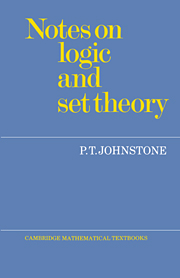3 - First-order theories
Published online by Cambridge University Press: 05 June 2012
Summary
So far, we have considered equational logic (where we could formulate assertions (equations) about the mathematical structures we were discussing, but didn't have any way of combining them) and propositional logic (where we studied logical combinations of assertions, but didn't attach any intrinsic meaning to the primitive propositions which were being combined). The obvious next step is to put these two ideas together. Actually, we shall miss out the next step in a traditional development of logic, the study of the first-order predicate calculus, and pass straight on to the predicate calculus with equality; predicate calculus without equality is generally similar but less interesting.
We wish to define a notion of formal language which will be adequate for handling a wide variety of mathematical structures. In addition to the features we have met so far (primitive operations, equations between terms, propositional connectives), there will be two new ones: primitive predicates and first-order quantifiers. An (n-ary) primitive predicate (φ, say) is something whose intended interpretation in a structure A is a subset of An thus if a1,…, an are elements of A, φ(a1,…,an) will be the assertion that the n-tuple (a1,…,an) belongs to the subset which interprets φ. A quantifier is a unary operation on assertions of the type represented by the English phrases ‘for all x …’ or ‘there exists x such that …’; the qualification ‘first-order’ means that the ‘x’ being quantified is understood to range over elements of the structure A (rather than, for example, arbitrary subsets of A).
- Type
- Chapter
- Information
- Notes on Logic and Set Theory , pp. 18 - 33Publisher: Cambridge University PressPrint publication year: 1987



